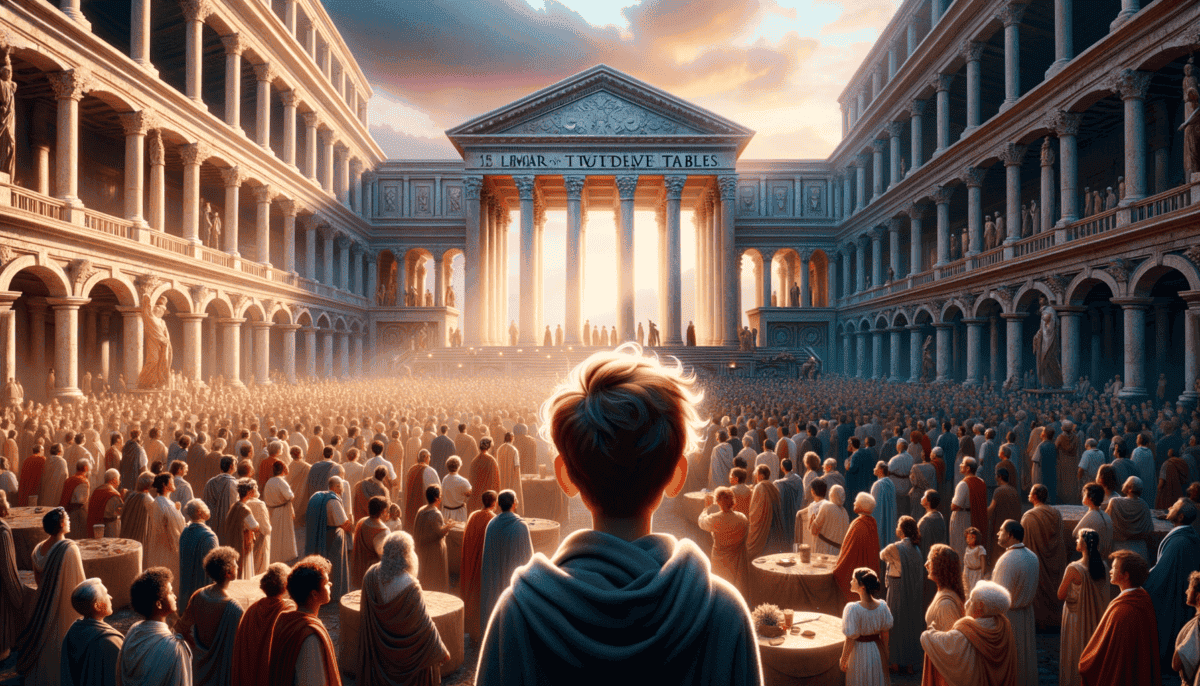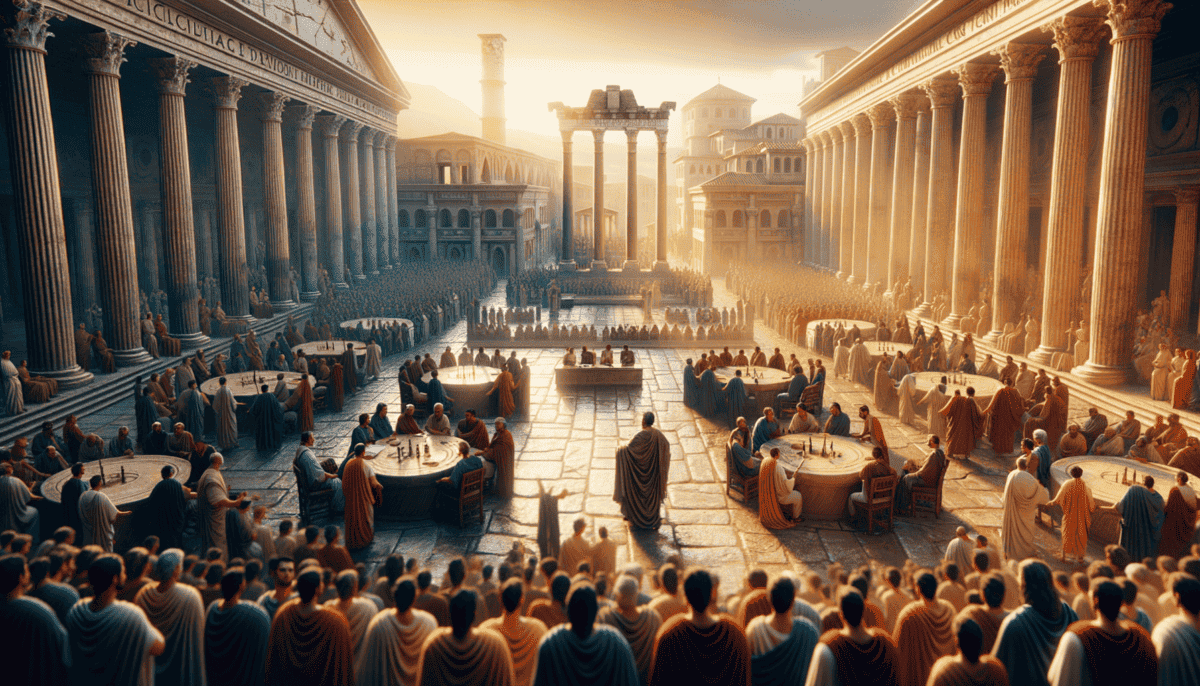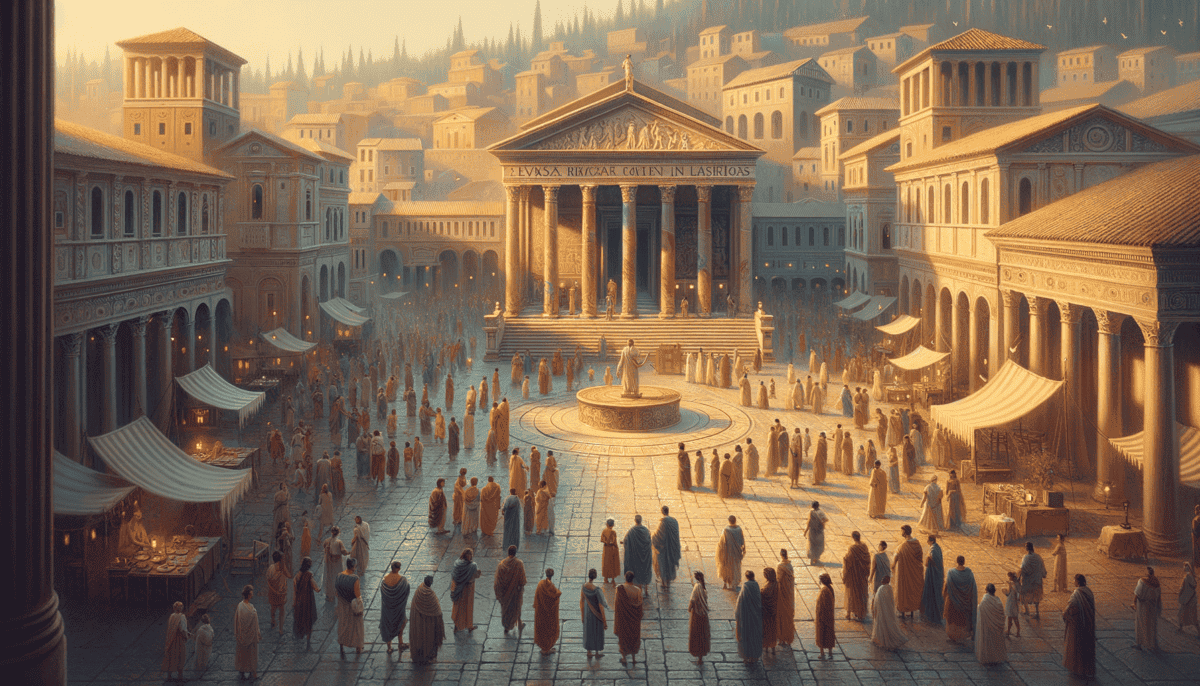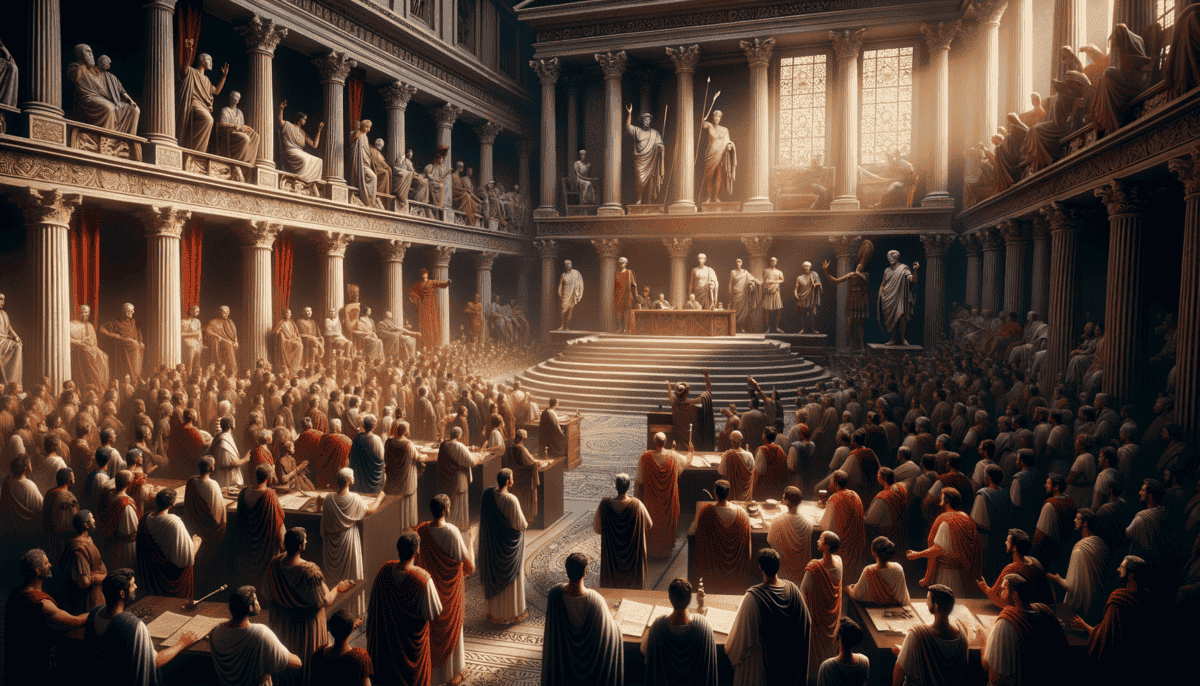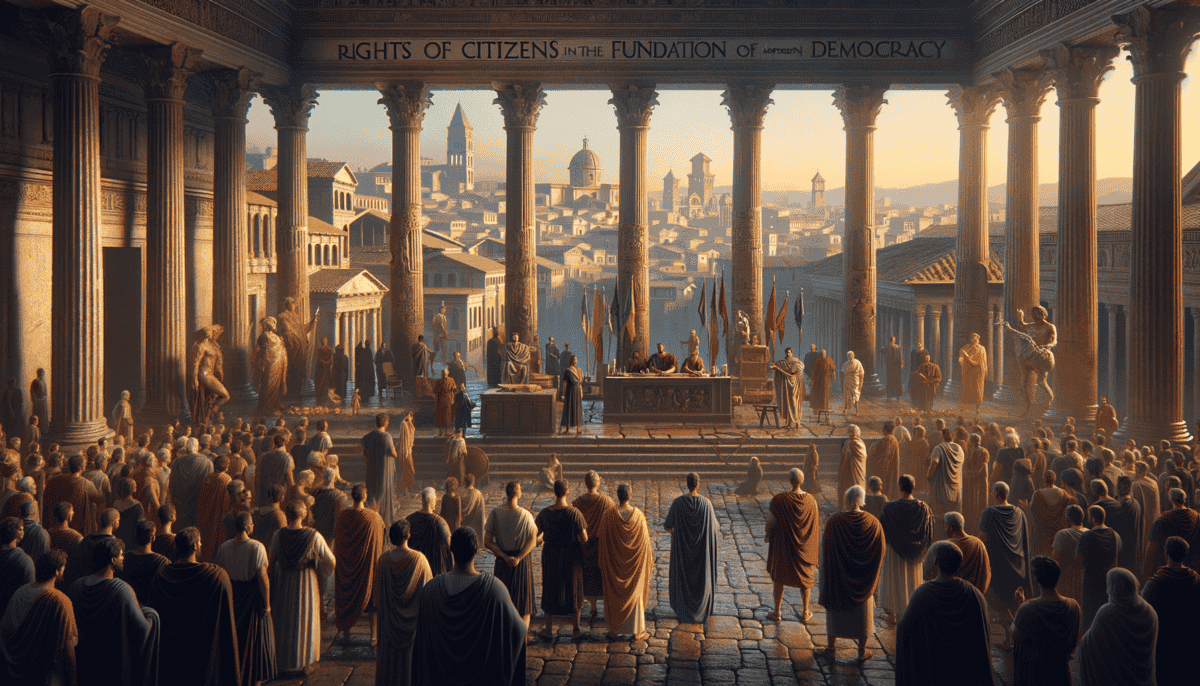The Streets of Early Rome
Marcus kicked a small stone along the dusty street as he walked through the busy marketplace of Rome. The year was 450 BCE, and the morning sun cast long shadows between the tall buildings. At just ten years old, Marcus already knew his place in Roman society – he was a plebeian, one of the common people. ️
"Watch where you're going, boy!" a wealthy patrician shouted as Marcus accidentally bumped into his flowing purple toga. Marcus quickly stepped back, lowering his eyes.
"Sorry, noble sir," he mumbled, his cheeks burning red. The patrician swept past without acknowledging the apology.
Marcus's father Lucius placed a gentle hand on his son's shoulder. "Keep your head up, son. We may not wear purple togas, but we are still citizens of Rome."
The marketplace buzzed with activity. Merchants called out their wares while slaves carried heavy loads for their masters. Marcus noticed how differently people treated each other based on their clothes and appearance.
• Patricians – the wealthy noble families
• Plebeians – the common working people
"Papa," Marcus asked, "why do the patricians get to make all the rules? Don't we count too?"
Lucius sighed. "It's not fair, is it? They control the Senate, the courts, and even decide when we go to war. But things are starting to change."
As they walked past the Forum, Rome's central meeting place, Marcus saw a group of angry plebeians gathering. Their voices rose in protest against unfair debt laws that could turn poor citizens into slaves.
"We demand justice!" one man shouted, his fist raised high. "Written laws that protect all Romans!"
Marcus felt a flutter of excitement in his chest. Maybe things really were about to change. He watched as more people joined the crowd, their voices growing stronger together.
That evening, as Marcus helped his mother prepare dinner in their small apartment building called an insula, he couldn't stop thinking about what he'd seen.
"Mama," he said, stirring the pot of lentil stew, "do you think we'll ever have the same rights as the patricians?"
His mother smiled. "The gods gave us all the same hearts, Marcus. Someday others will see that too."
Through the window, Marcus could hear the continuing shouts from the Forum. The sound of people demanding change filled him with hope. He may have been just a plebeian boy, but he dreamed of a Rome where all citizens would be treated fairly.
As he drifted off to sleep that night on his straw mattress, Marcus made a promise to himself. One day, he would help make Rome a place where everyone's voice mattered – patrician and plebeian alike.
Thunder rumbled in the distance, as if the gods themselves were listening to his silent vow. Change was coming to the streets of Rome, and even a young plebeian boy could feel it in the air.
A New Dawn for Justice
The morning air crackled with excitement as Marcus raced through the crowded streets. Something big was happening in the Forum. People whispered about new laws being written down for everyone to see!
“Papa, look!” Marcus pointed to a large wooden board being carried toward the center of the Forum. “What are they doing?”
Lucius smiled broadly. “That, my son, is the beginning of real justice in Rome. They’re creating the Twelve Tables – our very first written laws!”
• Everyone could read them
• They applied to all citizens
• They protected both rich and poor
Marcus watched in amazement as workers began carving words into the wooden boards. A crowd gathered around, both patricians and plebeians standing together to see this historic moment.
“Can you read what it says, Papa?” Marcus asked, standing on his tiptoes.
“It says that no one can be punished without a fair trial,” Lucius read proudly. “And look here – it says that the same laws apply to all citizens, rich or poor!”
A patrician woman in a fine silk dress frowned. “This is outrageous! How can we have the same laws as common folk?”
An old plebeian farmer stepped forward. “The sun rises on all of us the same, noble lady. Why shouldn’t justice do the same?”
Marcus grinned at the farmer’s clever words. More people were nodding in agreement.
Throughout the day, Marcus watched as more laws were carved into the boards. He learned that now, if someone accused you of doing something wrong, you had the right to defend yourself in court. Even a poor person could have their day in front of a judge!
“This changes everything,” Lucius explained. “Before, the patricians could make up rules as they went along. Now, everyone can see the laws for themselves.”
That afternoon, Marcus saw something he’d never seen before – a patrician boy about his age got in trouble for breaking a merchant’s pottery. Instead of just walking away like usual, the boy’s father had to pay for the damage, just as any plebeian would!
“It’s working already!” Marcus whispered excitedly to his father.
At home that evening, Marcus practiced drawing the letters he’d seen on the Twelve Tables. His mother watched proudly as he worked.
“Mama, when I grow up, I want to help make good laws too,” Marcus declared.
“With these new laws, maybe you can,” she replied. “The future is changing, my little lawmaker.”
As Marcus fell asleep that night, he dreamed of a Rome where justice was as steady and reliable as the great stone buildings that lined its streets. The Twelve Tables were just the beginning, but what a wonderful beginning it was!
Outside his window, the moon shone down on the wooden boards in the Forum, where Rome’s new laws stood proud and tall for all to see. Tomorrow would bring new challenges, but for now, justice had found its voice in the eternal city.
A Voice in the Assembly
Marcus could hardly believe it – today was his first day to visit the Citizen’s Assembly! At sixteen, he was finally old enough to join the meetings where Romans made big decisions about their city.
“Stand tall,” Lucius said, adjusting Marcus’s toga. “Today you become a true citizen of Rome.”
The Forum buzzed with excitement as hundreds of citizens gathered. Marcus had never seen so many people in one place!
• All free male citizens could vote
• Each person got one vote
• Decisions needed majority support
“Welcome, citizens!” called out the assembly leader. His voice boomed across the square. “Today we vote on building new roads to help our farmers bring food to the city.”
Marcus felt his heart racing. He would get to help make this choice!
“But roads cost money,” grumbled an old patrician. “Why should we pay for farmer’s paths?”
A young farmer stepped forward. “Because your bread doesn’t walk to your table by itself!” Several people laughed, including Marcus.
“What do you think?” Marcus whispered to his father.
“I think you should decide for yourself,” Lucius smiled. “That’s what being a citizen means.”
The leader explained how they would vote. Everyone would line up in different areas based on their choice – one side for yes, one for no. ️
Marcus watched as people began moving. He thought about the farmers who brought food to his family’s shop. Good roads would help everyone, he decided.
With confident steps, Marcus walked to the “yes” side. His father beamed with pride.
“The vote is decided!” the leader announced. “The roads will be built!”
After the big vote, smaller groups formed to discuss other issues. Marcus joined a circle where young citizens were talking about clean water for all neighborhoods.
“Even the poorest streets deserve fresh water,” said a girl named Julia. Marcus nodded in agreement.
“That’s our next fight,” Julia smiled. “Will you help?”
“Count me in!” Marcus replied. He was starting to understand – being a citizen meant working together to make Rome better for everyone.
Walking home that evening, Marcus spotted the Twelve Tables still standing proud in the Forum. He remembered watching them being carved just a few years ago.
“Things really are changing,” he said to his father.
“Yes, and you’re part of that change now,” Lucius replied. “How does it feel?”
Marcus grinned. “It feels like responsibility. And hope.”
At home, Marcus’s mother was waiting eagerly. “How was your first assembly?”
“Amazing! We voted for new roads, and I met others who want to help make Rome better. I can’t wait for the next meeting!”
That night, Marcus looked out at the city lights twinkling under the stars. ⭐ Being a citizen wasn’t just about having rights – it was about using those rights to help others. Tomorrow would bring new challenges and more chances to make a difference in the growing city he loved.
New Friends, New Rights
The morning sun cast long shadows across the Forum as Marcus hurried to meet his new friend Julia. Today was special – representatives from cities all around Italy were coming to Rome!
“Look at all the different clothes and languages!” Julia pointed to the colorful crowd gathering near the Senate building.
Marcus noticed a boy about his age wearing strange-looking sandals. The boy seemed lost.
“Are you okay?” Marcus asked. “I’m Marcus.”
“I’m Titus, from Capua,” the boy replied with a slight accent. “Everything is so big here!”
“Want to explore with us?” Julia offered. Titus smiled and nodded.
As they walked, Titus shared stories about life in Capua. “Our city just got Roman citizenship. Now we can vote and trade just like you!”
“That’s wonderful!” Marcus exclaimed. “But isn’t it hard learning all our laws?”
“A little,” Titus admitted. “But worth it. Now we’re part of something bigger.”
They passed a group of merchants speaking a language Marcus didn’t know. Some patricians were frowning at them.
“Not everyone likes change,” Julia whispered. “But look how much stronger Rome is getting with new citizens bringing their skills!”
Marcus watched a Greek doctor treating patients near the temple. “She couldn’t do that before citizenship,” Julia explained. “Now she can help everyone!”
Titus’s eyes widened. “In Capua, we have olive farmers who want to sell here. Now they can!”
“And my father says more citizens means more soldiers to protect Rome,” Marcus added proudly.
Later, they sat sharing bread and stories. A small crowd gathered to listen to Titus describe Capuan festivals.
“Will you teach us your dances?” a Roman girl asked shyly.
“If you teach us yours!” Titus laughed.
Marcus watched as Roman and Capuan children started dancing together, mixing steps from both cities. His heart felt full.
“This is what Rome should be,” Julia said softly. “Everyone bringing their gifts, making something new together.”
That evening, Marcus and Titus stood on a hill overlooking the city. Lamps were being lit, making Rome glow like stars had fallen to earth. ✨
“Will you visit Capua someday?” Titus asked.
“Of course! We’re all Romans now,” Marcus smiled. “Different cities, same rights.”
As Marcus walked home, he saw new faces everywhere – doctors from Greece, traders from Gaul, artists from Egypt. Each one making Rome richer, stronger, better.
“Mother!” he called out. “Wait until you hear about my new friend from Capua!”
His mother smiled knowingly. “Rome’s heart grows bigger every day, doesn’t it?”
Marcus nodded happily. Tomorrow would bring more new friends, new ideas, and new ways to build their growing family of citizens. The future looked bright indeed!
Standing Up for Change
Dark clouds gathered over the Forum as Marcus and his friends huddled together. Things in Rome were getting tense. ️
“The Senate won’t listen to us anymore,” Julia whispered. “They’re taking away the new rights we fought for!”
Marcus watched as angry citizens gathered near the speaking platform. Rich senators had been making laws that hurt poor people again.
“My father can’t vote now,” Titus said sadly. “They changed the rules to make it harder for people from Capua.”
Marcus felt his hands curl into fists. “This isn’t fair! We have to do something!”
A crowd was forming around Claudia, a brave woman who spoke for the common people. Marcus and his friends moved closer to listen.
“Citizens of Rome!” Claudia’s voice rang out. “We must stand together! Rich or poor, old city or new – we all deserve a voice!”
The crowd cheered. Marcus saw people from all parts of Rome joining together – bakers, farmers, craftsmen, and merchants.
“Let’s make signs,” Julia suggested. “We can write what we believe in!”
Soon, Marcus and his friends were holding wooden boards with messages:
“Equal Rights for All Citizens!”
“Fair Laws for Everyone!”
“Remember the Twelve Tables!”
More people joined their peaceful protest. Marcus saw his mother bringing bread to share. Titus’s father brought water for thirsty protesters.
“Look!” Julia pointed excitedly. “Some patricians are joining us too!”
Marcus spotted wealthy Romans standing with the crowd. They wore fine togas but held the same signs as everyone else.
“When we work together,” Claudia announced, “we are stronger than any law that divides us!”
Days passed. The protesters stayed peaceful but firm. They sang songs about freedom and shared stories about why rights mattered.
Finally, after a week, the Senate called for a meeting. They invited Claudia and other citizen leaders to speak.
“Your voices are heard,” the head senator declared. “We will restore the voting rights and make them stronger!”
The crowd erupted in cheers. Marcus hugged his friends, happy tears in their eyes.
“We did it!” Titus shouted joyfully.
“No,” Marcus corrected with a smile. “We’re still doing it. Every day we have to protect our rights.”
That evening, families celebrated in the streets. Children danced while adults discussed plans for making Rome better for everyone.
“I’m proud of you,” Marcus’s mother said, hugging him tight. “You’re learning that being a citizen means standing up for what’s right.”
As the stars came out, Marcus sat with his friends on their favorite hill. The city lights below seemed brighter somehow.
“Things will get hard again,” Julia said thoughtfully. “But now we know what to do.”
Marcus nodded. Democracy was like a garden – it needed constant care to grow strong and beautiful. And he was ready to help it grow.
A Legacy of Hope
Years had passed, and Marcus now walked through Rome’s busy streets as a grown man. The morning sun painted the marble buildings golden.
“Uncle Marcus! Tell us a story!” called his niece Lucia, running up with her friends. They loved hearing about the old days.
Marcus sat on a bench in the Forum, children gathering around him like eager birds. “When I was your age,” he began, “being a citizen meant something very different.”
“Was it true you couldn’t vote?” asked one boy.
Marcus nodded. “Many couldn’t. But people from all over Rome joined together to change things.”
“Like Claudia?” Lucia’s eyes sparkled. She loved hearing about the brave speaker.
“Yes, like Claudia. And like your parents, and neighbors, and even some rich patricians who believed in fairness.”
A group of citizens passed by, heading to vote on new laws. Marcus smiled, seeing people from every part of Rome walking together.
“Today, our city is stronger because we learned to listen to all voices, not just the powerful ones.”
“Look!” Lucia pointed to the wall where the Twelve Tables still stood. “The laws protect everyone now!”
Marcus touched the ancient stone. “And new laws make things even better. Did you know people in far provinces can be citizens too?”
The children’s eyes widened. One girl raised her hand. “My grandmother came from Greece. She votes here!”
“That’s right,” Marcus smiled. “Rome grows stronger when we welcome new citizens.”
A familiar voice called out. “Still teaching the young ones, Marcus?”
It was Julia, now a respected community leader. Beside her stood Titus, who helped new citizens learn their rights.
“Someone has to tell them how we got here,” Marcus laughed. “And remind them what to do next.”
Julia sat down. “What do you think that is, children?”
Lucia stood up straight. “Protect everyone’s rights! Stand up for what’s fair!”
“And?” Titus prompted with a twinkle in his eye.
“Vote!” the children chorused. “Speak up! Help others!”
Marcus felt pride warm his heart. These young ones understood what took his generation years to learn.
| Past Rome | Present Rome |
| Limited rights | Equal rights |
| Few could vote | Many can vote |
| Divided people | United citizens |
“The work isn’t finished,” Marcus told the children. “Each generation must protect and improve these rights.”
“Like tending a garden!” Lucia exclaimed, remembering his favorite saying.
“Exactly like that,” Marcus beamed. “And you are the new gardeners.”
As the sun climbed higher, the children ran off to their lessons, but Marcus knew they carried something precious – understanding.
“Look at our city now,” Julia said softly. “Would you believe this was possible when we were young?”
Marcus watched people of all backgrounds walking freely through the Forum – voting, speaking, participating in their shared democracy.
“We didn’t just change laws,” Titus added. “We changed hearts.”
Marcus nodded, feeling grateful for how far they’d come. The story of Roman citizenship wasn’t just about rights – it was about people coming together to build something better.
As he walked home that evening, Marcus saw new citizens posting signs for the next assembly. Their children played together in the streets, free and equal.
The setting sun painted the city in soft purple light. Tomorrow would bring new challenges, but Rome’s citizens would face them together. Just as they always had. Just as they always would.


